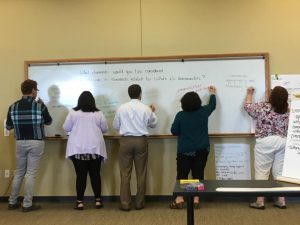Are You Ready for the New Standards? Standards Revision Process Maintaining Steady Pace
Members of the World Language Advisory Council working through a group exercise to craft a declaration of student interaction with culture in the world language classroom.
 How will the 2019 standards differ from the 1997 standards? While the revised standards carry all of the intellectual design, second language acquisition pedagogy, and flexibility of the 1997 standards, the 2019 standards are greater than the sum of their parts. There is a paradigm shift in the functionality of the language and the expectation of proficiency. World Language Advisory Council Member Jamie Honke shares, “The revised standards are going to put more emphasis on the necessity to integrate intercultural competencies into the curriculum…I think also the standards will impact those who focus a tremendous amount of time on grammar and explicit language instruction because our standards [will be] how to function within the language and not solely understanding the language’s function.” How will this impact teachers? Fellow Council Member Michelle Warren commented, “World Language teachers across the state recognize the urgency to push for ability to communicate and to help students use their language across the disciplines.” The standards process is lengthy; the work is not done. There will still be opportunities for involvement from others. Council Member Jami Holbein Swanson shared that the experience so far has been favorable. “There were protocols in place that allowed all voices to be heard, and understood. We had choice in how to proceed, and with the expertise in the room, our choices were well informed.”
How will the 2019 standards differ from the 1997 standards? While the revised standards carry all of the intellectual design, second language acquisition pedagogy, and flexibility of the 1997 standards, the 2019 standards are greater than the sum of their parts. There is a paradigm shift in the functionality of the language and the expectation of proficiency. World Language Advisory Council Member Jamie Honke shares, “The revised standards are going to put more emphasis on the necessity to integrate intercultural competencies into the curriculum…I think also the standards will impact those who focus a tremendous amount of time on grammar and explicit language instruction because our standards [will be] how to function within the language and not solely understanding the language’s function.” How will this impact teachers? Fellow Council Member Michelle Warren commented, “World Language teachers across the state recognize the urgency to push for ability to communicate and to help students use their language across the disciplines.” The standards process is lengthy; the work is not done. There will still be opportunities for involvement from others. Council Member Jami Holbein Swanson shared that the experience so far has been favorable. “There were protocols in place that allowed all voices to be heard, and understood. We had choice in how to proceed, and with the expertise in the room, our choices were well informed.”


